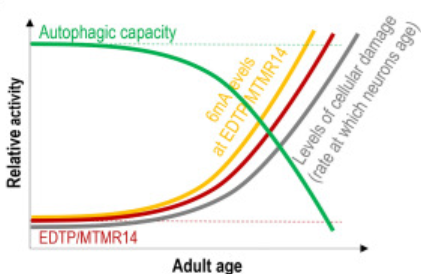Címlap
 |
News
PHAGE THERAPY AGAINST SUPER BACTERIA
 |
The assistant professor of our department, Ari Eszter, and our PhD students András Asbóth and Balázs Bohár also participated in the international research that mapped the region-specific phage collections. The work may contribute to curbing the spread of antibiotic-resistant superbug. The article was published in Cell. |
Just published
 |
The Drosophila research group published their research entitled "A conserved MTMR lipid phosphatase continuously suppresses autophagia in brain neurons during aging" in the journal Scientific Reports in December 2022. |
Ageing is driven by the progressive, lifelong accumulation of cellular damage. Autophagy (cellular self-eating) functions as a major cell clearance mechanism to degrade such damages, and its capacity declines with age. Despite its physiological and medical significance, it remains largely unknown why autophagy becomes incapable of effectively eliminating harmful cellular materials in many cells at advanced ages. Here we show that age-associated defects in autophagic degradation occur at both the early and late stages of the process. Furthermore, in the fruit fly Drosophila melanogaster, the myotubularin-related (MTMR) lipid phosphatase egg-derived tyrosine phosphatase (EDTP) known as an autophagy repressor gradually accumulates in brain neurons during the adult lifespan. The age-related increase in EDTP activity is associated with a growing DNA N6-adenine methylation at EDTP locus. MTMR14, the human counterpart of EDTP, also tends to accumulate with age in brain neurons. Thus, EDTP, and presumably MTMR14, promotes brain ageing by increasingly suppressing autophagy throughout adulthood. We propose that EDTP and MTMR14 phosphatases operate as endogenous pro-ageing factors setting the rate at which neurons age largely independently of environmental factors, and that autophagy is influenced by DNA N6-methyladenine levels in insects.
BTDK conference 2022
 |
At this year's BTDK conference, the Department of Genetics was again represented by a number of students. We would like to thank all the participants and the supervisors for their work, with special thanks to the prize-winning speakers: Gergő Falcsik (supervisor Tibor Kovács) for the first place in the Genetics and Embryology section, György Ullaga (supervisor Máté Varga) for the special prize of MAGE, and Sára Szabó Kata (supervisor Máté Varga) for the special prize of the Bolyai College and the audience prize of the Genetics and Embryology section. Thank for the work of the organisers. |
And what about science communication?
 |
SciComm4all's animated video series offers tips and tricks for science communicators and public speakers. Máté Varga, associate professor the Genetics department, also participated in the international project. |
Night of researchers in the Genetics Department, September 30, 2022
 |
 |
 |
 |
 |
 |
 |
 |
TDK positions
TDk position for MSc/BSc students in 2nd Department of Pediatrics SEMMELWEIS UNIVERSITY, FACULTY OF MEDICINE https://www.facebook.com/599897295/videos/617095096247526/
Eszter Ari published a paper about the genomic epidemiological analysis of SARS-CoV-2 genomes from Hungary
Eszter Ari, Bálint Márk Vásárhelyi, Gábor Kemenesi, Gábor Endre Tóth, Brigitta Zana, Balázs Somogyi, Zsófia Lanszki, Gergely Röst, Ferenc Jakab, Balázs Papp, Bálint Kintses A single early introduction governed viral diversity in the second wave of SARS-CoV-2 epidemic in Hungary, Virus Evolution, Volume 8, Issue 2, 2022, veac069, https://doi.org/10.1093/ve/veac069
 |
 |
Archive
Conferences
Hungarian Molecular Life Science Conference 2021. 5-7 November 2021 | Hotel Eger Park
Dear Colleagues, the Hungarian Biochemical Society (MBKE) representing the disciplines of biochemistry and molecular biology, and the Hungarian Genetics Society (MAGE) acting for genetics, cell- and developmental biology, organize their fourth joint conference, entitled „Hungarian Molecular Life Sciences 2021”, in Eger, Hungary, between 5-7 November 2021. We are hopeful that by that time, the COVID-19 pandemic will not prevent us from meeting in person, otherwise we are fully set for an online format. https://2021.hunlifesci.hu/
2nd Conference of the Visegrád Group Society for Developmental Biology will take place in the Biological Research Centre (BRC) Szeged, Hungary, between 2-5 September, 2021
We aim to organize a meeting which provides an ideal academic platform for researchers of the V4 region (and beyond) to present their latest research findings and describe emerging technologies, and directions in the field of developmental biology. A conference with a creative and friendly atmosphere, where former acquaintances are renewed and new collaborative partnerships are formed. The meeting will take place in the new conference center of the Biological Research Centre (BRC) Szeged, where the lecture halls, the poster and company exhibition areas will all be located in one building, together with the restaurant and social rooms, providing ample possibilities for professional discussions. https://www.v4sdbszeged.com/

